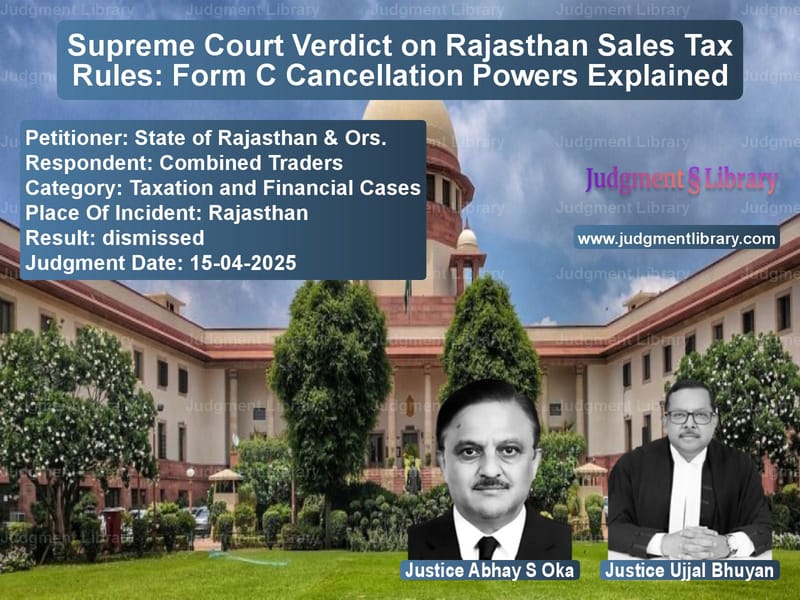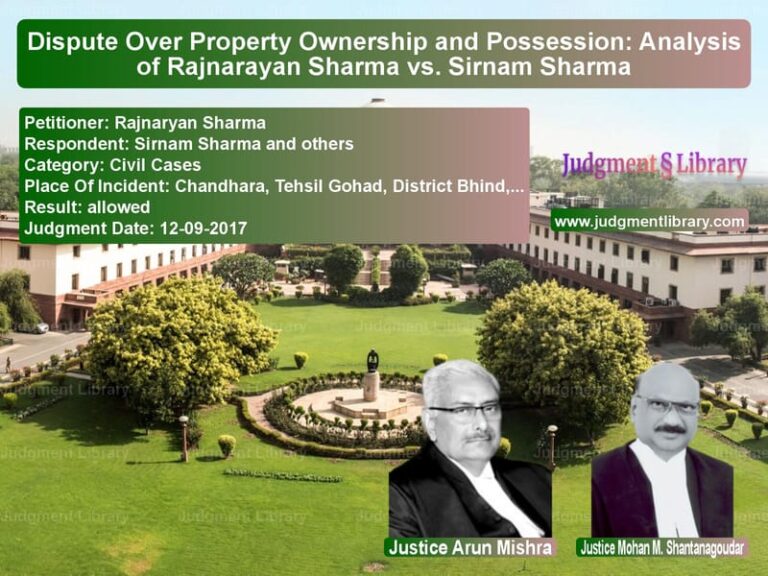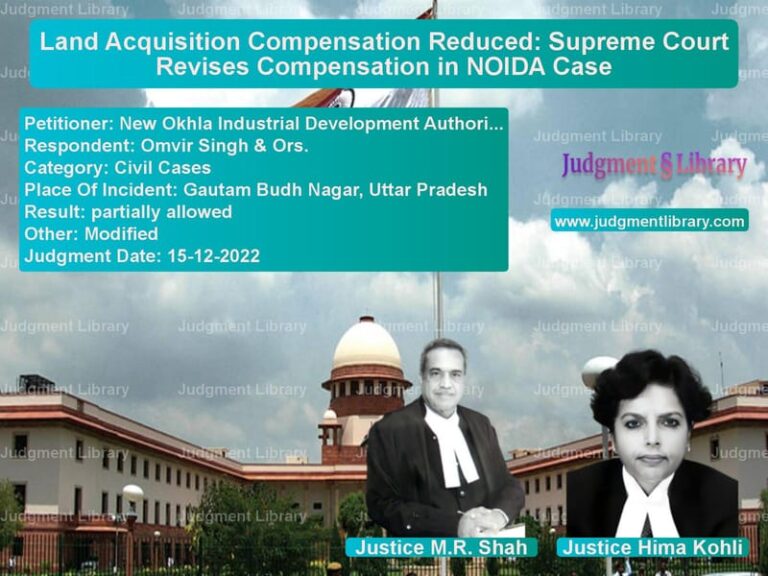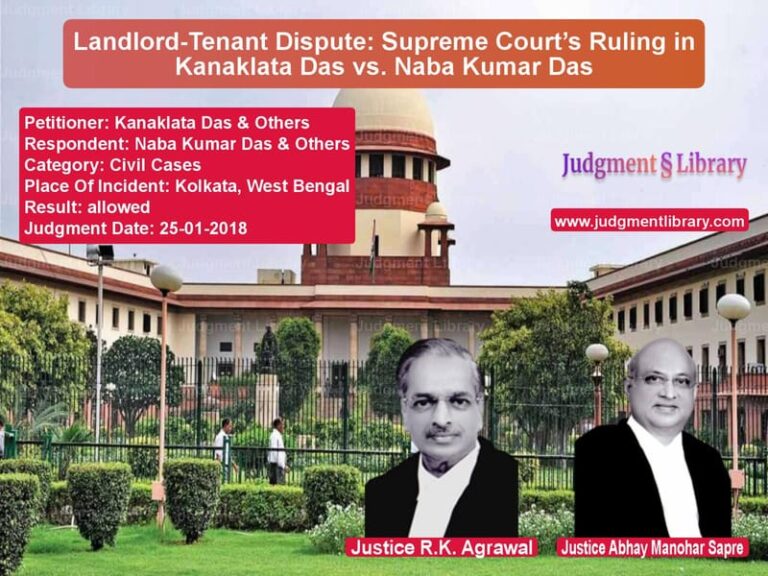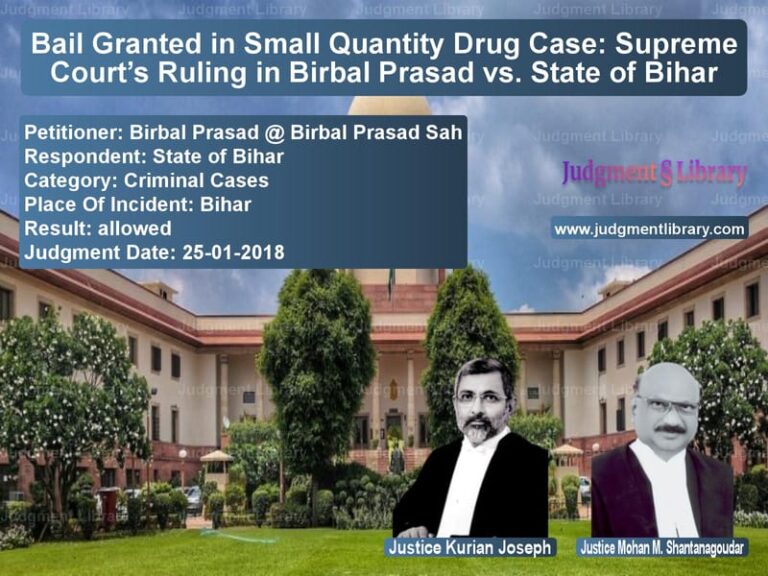Supreme Court Verdict on Rajasthan Sales Tax Rules: Form C Cancellation Powers Explained
The Supreme Court of India recently delivered a significant judgment in the case of State of Rajasthan & Ors. vs. Combined Traders, addressing the contentious issue of whether state governments have the power to cancel Form C declarations under the Central Sales Tax (CST) Act. This landmark ruling clarifies the division of rule-making powers between central and state governments in taxation matters, particularly concerning inter-state trade.
The case originated from a challenge to sub-rule (20) of Rule 17 of the Central Sales Tax (Rajasthan) Rules, 1957, which allowed state authorities to cancel Form C declarations obtained through misrepresentation or fraud. The respondent, Combined Traders, had sold goods worth crores to two firms (M/s. H.G. International and M/s. Saraswati Enterprises) against Form C declarations. When these firms were found to be non-functional at their registered addresses, Rajasthan tax authorities cancelled their Form Cs using the contested rule.
Arguments of the Appellants (State of Rajasthan):
The state government argued that Section 13(3) of the CST Act granted them general rule-making power to carry out the Act’s purposes, including preventing fraud. Their counsel contended: “sub-rule (20) of Rule 17 has been enacted to prevent fraud and contravention of the provisions of the CST Act and rules made thereunder.” They emphasized that the rule was consistent with the Act’s objectives and necessary to check tax evasion.
Arguments of the Respondent (Combined Traders):
The respondent’s counsel highlighted the specific division of powers under Section 13, arguing: “Clause (d) does not confer any power on the Central Government to make rules to cancel any declaration or certificate under the CST Act.” They pointed out that while Section 7(5) explicitly provides for cancellation of registration certificates, no similar provision exists for Form C declarations in Section 8.
Supreme Court’s Analysis and Decision:
The Court meticulously examined the CST Act’s provisions, particularly Section 13 which divides rule-making powers. Justice Oka noted: “A perusal of the Central Registration Rules shows that no power is conferred on any authority to cancel the declaration in Form C.” The judgment emphasized that while states have rule-making power under Section 13(3), such rules cannot be inconsistent with central rules made under Section 13(1).
The Court relied on its earlier decision in State of Madras v. R Nand Lal & Co, observing: “We are of the opinion that it was not within the competence of the State authorities under Section 13(3) and (4) of the Central Sales Tax Act to provide that a single declaration covering more than one transaction shall not be made.” This precedent established that matters specifically covered by Section 13(1)(d) (like declaration forms) fall exclusively within central government’s domain.
The Court concluded: “the State Government cannot frame rules in exercise of power under Section 13(3) which will be inconsistent with the rules framed by the Central Government in exercise of powers under Section 13(1) of the CST Act.” It upheld the Rajasthan High Court’s finding that sub-rule (20) of Rule 17 was ultra vires the CST Act.
This judgment provides crucial clarity on the division of taxation powers between center and states, reinforcing that states cannot create cancellation mechanisms for forms whose prescription falls exclusively under central rule-making authority. The decision maintains uniformity in inter-state trade taxation while preventing overlapping jurisdictional claims.
Petitioner Name: State of Rajasthan & Ors..Respondent Name: Combined Traders.Judgment By: Justice Abhay S Oka, Justice Ujjal Bhuyan.Place Of Incident: Rajasthan.Judgment Date: 15-04-2025.Result: dismissed.
Don’t miss out on the full details! Download the complete judgment in PDF format below and gain valuable insights instantly!
Download Judgment: state-of-rajasthan-&-vs-combined-traders-supreme-court-of-india-judgment-dated-15-04-2025.pdf
Directly Download Judgment: Directly download this Judgment
See all petitions in Income Tax Disputes
See all petitions in GST Law
See all petitions in Tax Evasion Cases
See all petitions in Customs and Excise
See all petitions in Tax Refund Disputes
See all petitions in Judgment by Abhay S. Oka
See all petitions in Judgment by Ujjal Bhuyan
See all petitions in dismissed
See all petitions in supreme court of India judgments April 2025
See all petitions in 2025 judgments
See all posts in Taxation and Financial Cases Category
See all allowed petitions in Taxation and Financial Cases Category
See all Dismissed petitions in Taxation and Financial Cases Category
See all partially allowed petitions in Taxation and Financial Cases Category

